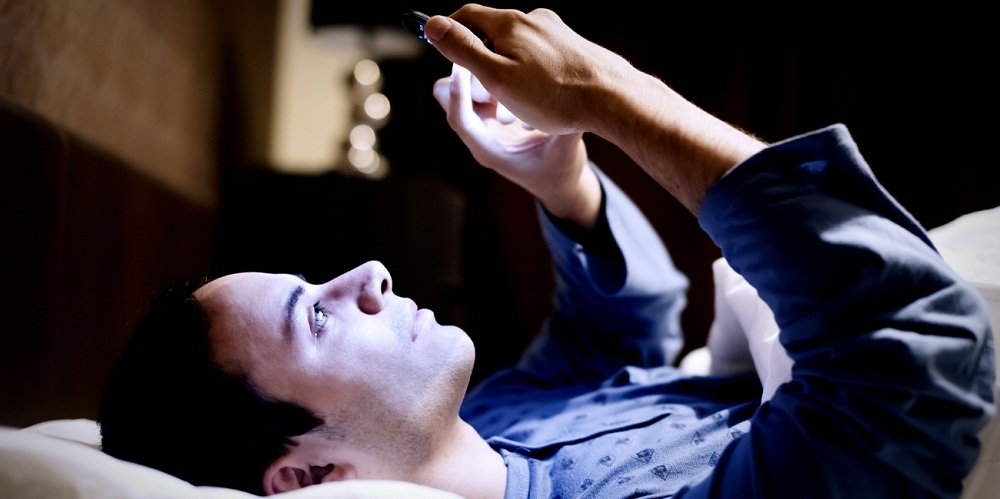Struggling to put down your phone at night or to step away from your laptop? It’s not a surprise that all the social updates and pictures, games, and videos available at our fingertips are keeping us up later and later. But this seemingly endless access to media, games, and friends/family can seriously affect your sleeping habits.
Melatonin Production Slows
That blue light given off from nearly every single electronic device is typically the main cause of sleep loss or trouble falling asleep. This is because blue light inhibits the production of melatonin, the hormone produced in the body that helps us fall asleep. Sleep.org mentions you should put down the phone or tablet and turn off the laptop or TV at least 30 minutes before you plan on going to sleep.
How does the blue light interfere with my melatonin?
The blue glow might seem gentle enough, but it can directly affect your quality of sleep. The small amounts of light that are emitted from the electronics will pass through your retina and into the hypothalamus (the part of the brain that controls the sleep patterns in the body.) This is when the melatonin production is affected and slowed down significantly over time.

Must Read: What to Eat for Better Sleep
Make sure to turn down the brightness of your electronic device when you’re using it at night. You should also remember to keep it at least one foot away from your face to prevent the blue light from accessing your hypothalamus. While it might seem difficult to do, it will keep your melatonin production balanced and therefore your sleep, uninterrupted.
If you are finding it really difficult to get to sleep on a daily basis, make your bedroom tech free. Remove any electronics-including the TV-to prevent any temptations. While it might seem harmless to check your phone or watch a little TV before falling asleep, that blue light is actually keeping you awake and making it more difficult to achieve better sleep.
Your Brain Stays Active Longer
One of the most important ways technology affects our sleep is the cognitive stimulation. According to WEbMd.com, as your brain revs up, the neurons will start to race, and its electrical activity will increase. This is the exact opposite of what your brain needs to do when you are trying to get some sleep.

Additionally, your body can react due to the flight or fight indicators from stress. This stress can be caused by an immersive video game, an email from work, or even a dramatic social update from a friend or family member. When this happens, the stress hormone is produced and released by the adrenal gland. Needless to say, a jolt of this hormone will prevent you from going to sleep.
Also See: How What You Eat Might Be Affecting Your Sleep
Having the ability to be reachable or online 24/7 is affecting the way our body’s wind down for the night. As you continue to stay up, later and later, you are subconsciously adjusting your body’s internal clock. This can cause delayed sleep syndrome to set in which means your body isn’t ready to fall asleep until that new time of midnight or even 2:00 a.m.
They Disrupt Your Sleep
While you might not be checking your phone or tablet right before bed, if you bring it to bed with you, chances are it’s disturbing your sleep. When you keep your phone or tablet next to you in bed or on a bedside table, just because you’re trying to sleep, doesn’t mean it will. Any ‘bings’ or vibrations caused from notifications will come through, whether you’re sleeping or not, to alert you of their presence.

Even though this is handy throughout the day-it keeps you in the know of all things important- these notifications can truly cause disrupted sleep. Any late night texts, calls, emails, Facebook updates, can keep you awake or worse, wake you up.
You May Like: 9 Things You Should Avoid Before Going To Bed
According to Sleep.org, nearly 72% of teens will sleep with their phone or at least one electronic device near them in their room. This of course leads to lack of proper sleep or disrupted sleep, which over time can equate to at least one hour of lost sleep each night.
Getting a good night’s rest is important for your overall health. Do yourself a favor and create better habits in the evening, so you can achieve better sleep. Make sure you put your phone or tablet away and turn off the TV at least half an hour before you’re ready for bed. Getting into this routine will not only allow your body to get back to a normal sleeping cycle, but you will soon notice better sleep each night.









This blog is very nice I always read your blog on daily basis in the blog you share nice information thanks for sharing your blog with us.
Comments are closed.